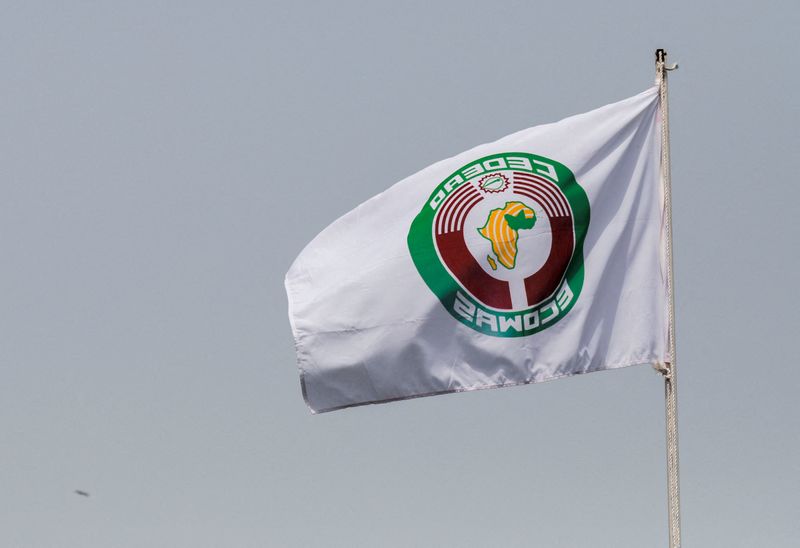
© Reuters. FILE PHOTO: Economic Community of West African States (ECOWAS) flag is pictured in Accra, Ghana March 25, 2022. REUTERS/Francis Kokoroko/File Photo
AES
-0.06%
Add to/Remove from Watchlist
Add to Watchlist
Add Position
Position added successfully to:
Please name your holdings portfolio
Type:
BUY
SELL
Date:
Amount:
Price
Point Value:
Leverage:
1:1
1:10
1:25
1:50
1:100
1:200
1:400
1:500
1:1000
Commission:
Create New Watchlist
Create
Create a new holdings portfolio
Add
Create
+ Add another position
Close
By Felix Onuah
ABUJA (Reuters) – The West African regional bloc should consider a change of strategy as it seeks to persuade junta-led countries to restore democracy and remain in the alliance, its chairman said on Saturday.
Leaders of the Economic Community of West African States (ECOWAS) are meeting to address a political crisis in the coup-hit region which deepened in January with military-ruled Niger, Burkina Faso, and Mali’s decision to exit the 15-member union.
“I urge them to reconsider the decision of these three nations to exit … and not to perceive our organisation as the enemy,” said ECOWAS chairman and Nigerian President Bola Tinubu in opening remarks before a closed-door session in the capital Abuja.
“We must reexamine our current approach to the quest for constitutional order.”
He did not give further details, but the comments will add to expectations that ECOWAS is readying to ease or lift sanctions on Niger, which include its suspension from the regional financial market and central bank.
ECOWAS closed borders and imposed the strict measures on Niger last year after soldiers detained President Mohamed Bazoum on July 26 and set up a transitional government, one of a series of recent military takeovers that have exposed the bloc’s inability to halt democratic backsliding.
Easing sanctions would be seen as a gesture of appeasement as ECOWAS tries to persuade the three junta states to remain in the nearly 50-year-old alliance and rethink a withdrawal. Their planned exit would undermine regional integration efforts and bring a messy disentanglement from the bloc’s trade and services flows, worth nearly $150 billion a year.
The sanctions have forced Niger, already one of the world’s poorest countries, to slash government spending and default on debt payments of over $500 million.
Niger’s coup followed two each in neighbouring Mali and Burkina Faso over the past three years, leaving a swath of territory in the hands of military governments that have also moved to distance themselves from former colonial ruler France and other Western allies.
ECOWAS also imposed sanctions on Mali in a bid to hasten its return to constitutional order although they were lifted in 2022.
The three countries have called ECOWAS’s sanctions strategy illegal and grounds for their decision to leave the bloc immediately without abiding by usual withdrawal terms.
The three have started cooperating under a pact known as the Alliance of Sahel States (AES (NYSE:AES)) and sought to form a confederation, although it is not clear how closely they plan to align political, economic and security interests as they struggle to contain a decade-old battle with Islamist insurgents.
Source: Investing.com




























